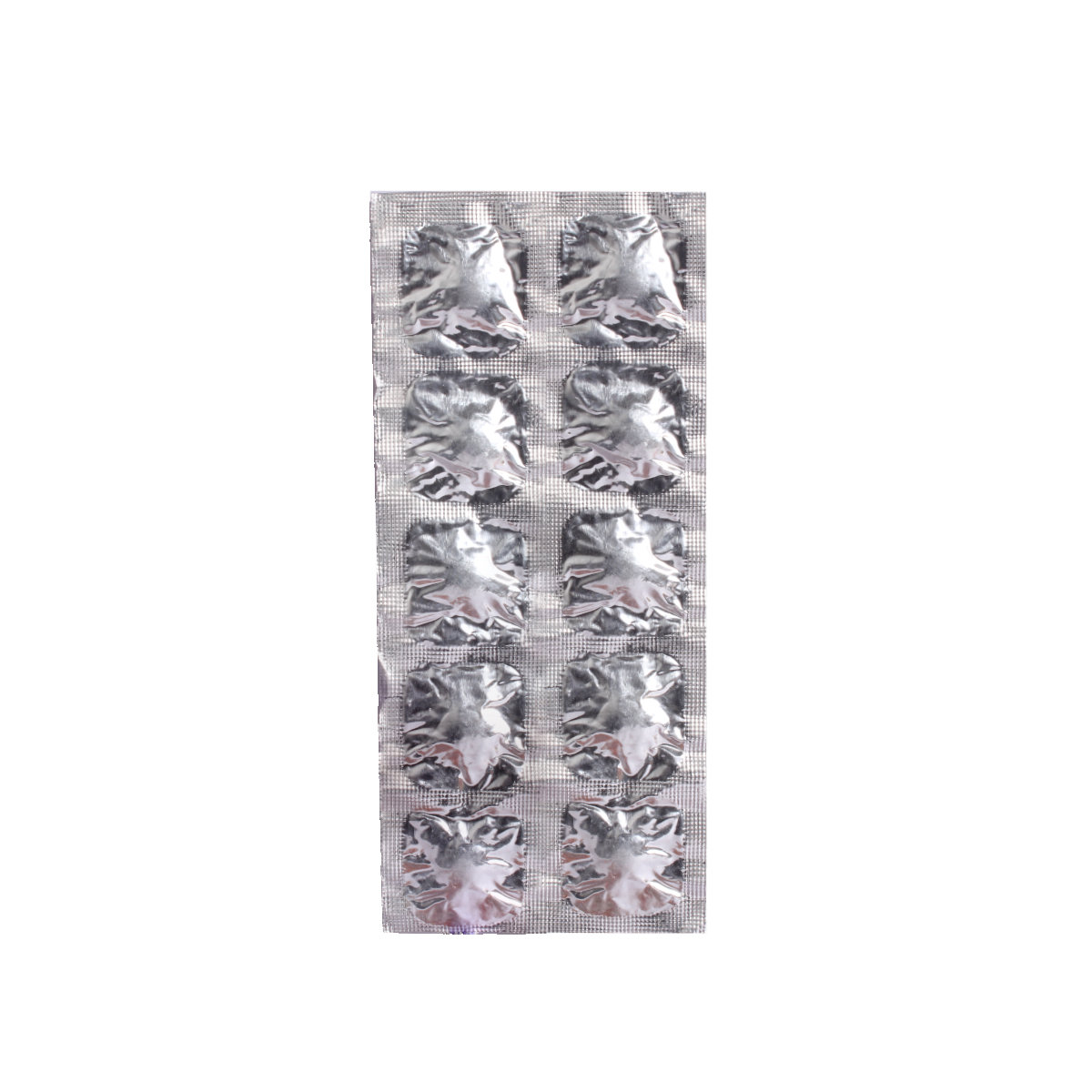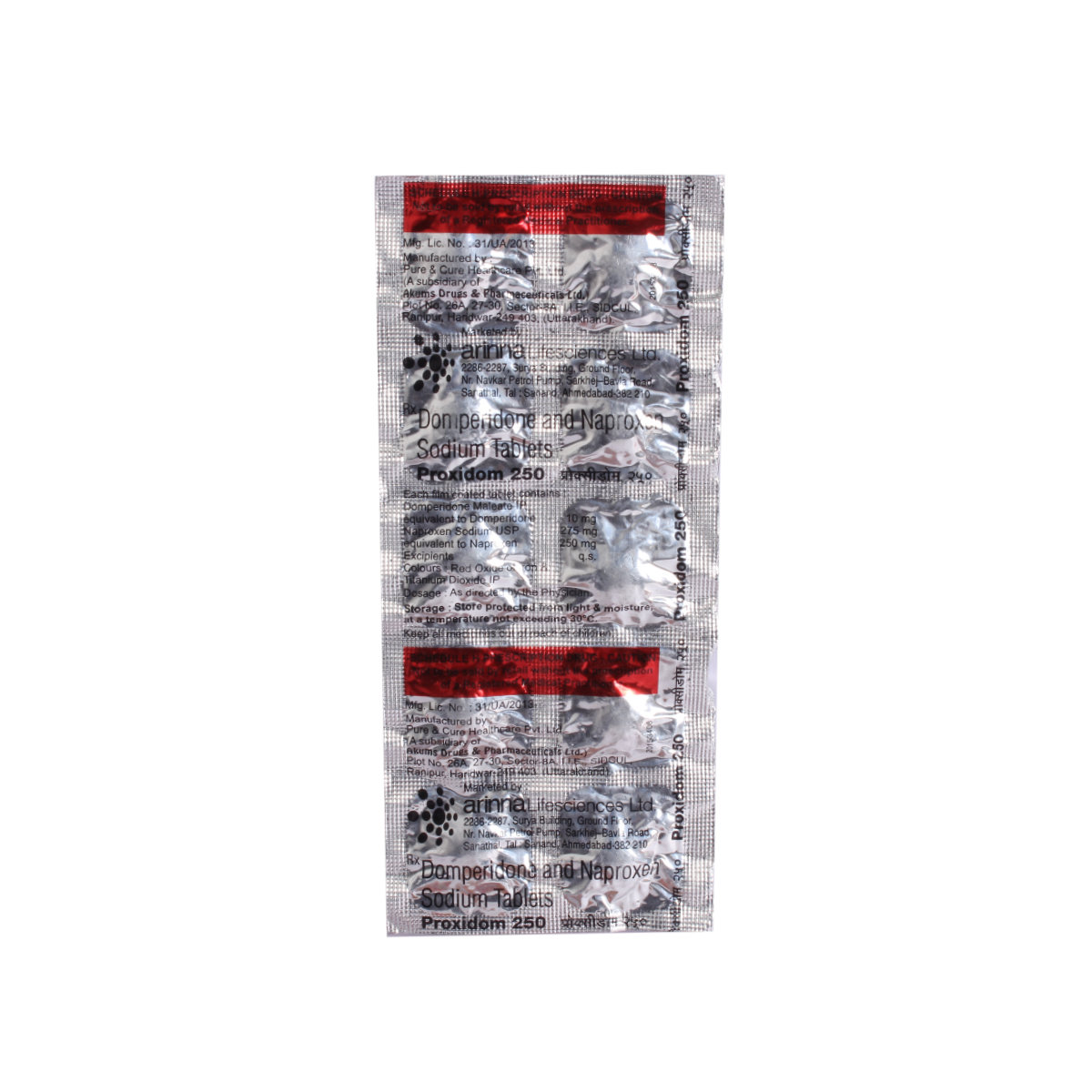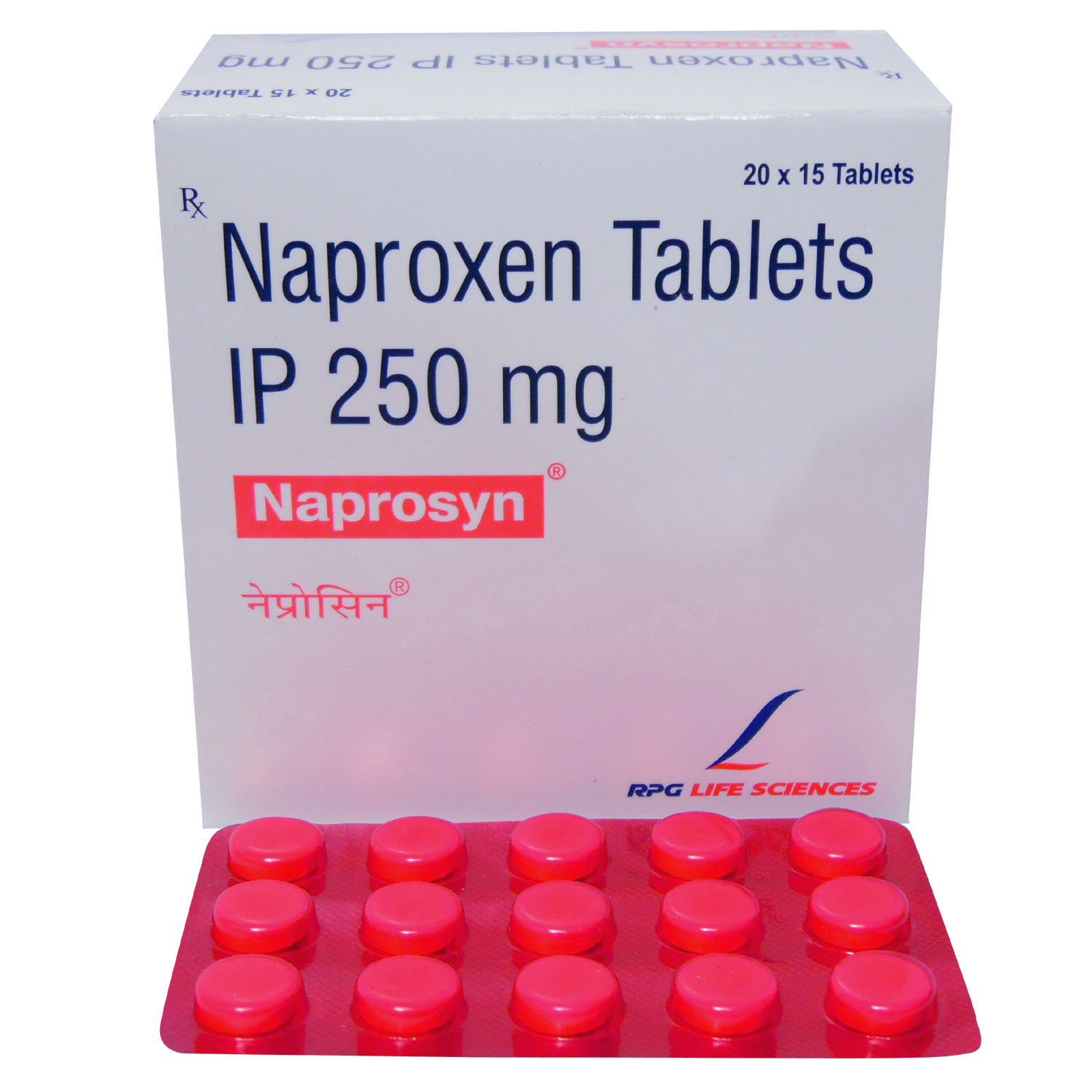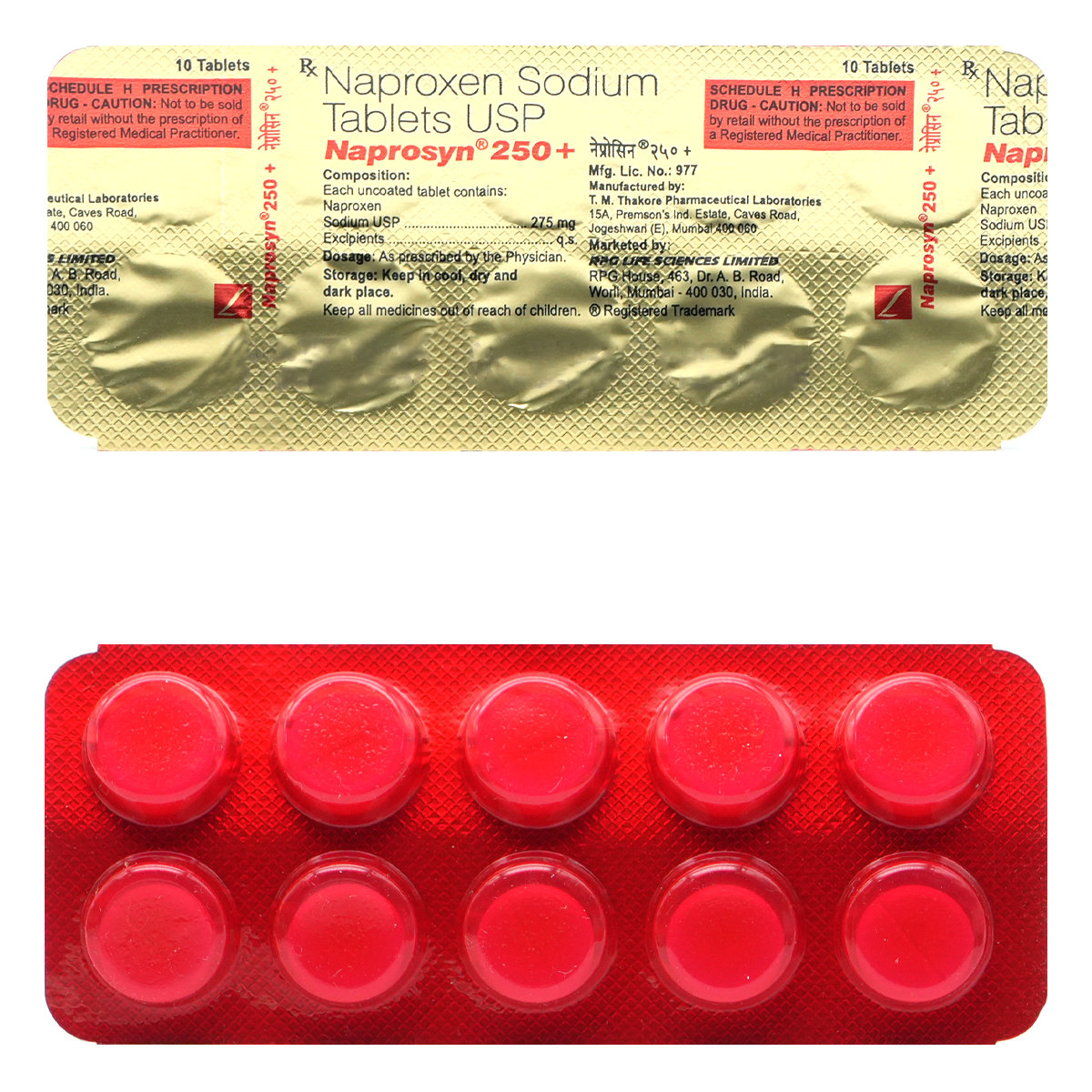Proxidom 250 mg Tablet 10's
MRP ₹62
(Inclusive of all Taxes)
₹9.3 Cashback (15%)
Provide Delivery Location
Online payment accepted
 Prescription drug
Prescription drugWhats That
Composition :
Manufacturer/Marketer :
Consume Type :
Expires on or after :
Return Policy :
About Proxidom 250mg Tablet
Proxidom 250mg Tablet belongs to a class of pain killers known as non-steroidal anti-inflammatory drugs (NSAIDs). Proxidom 250mg Tablet is primarily used to reduce pain and swelling in muscles and joints in conditions such as osteoarthritis, rheumatoid arthritis, ankylosing spondylitis (pain and stiffness in the backbone), cervical spondylitis (wear and tear of spinal discs in neck) and acute gout (severe pain due to excess of uric acid). Arthritis is a condition that causes swelling of one or more joints resulting in pain and stiffness of joints that worsen over time.
Proxidom 250mg Tablet contains Naproxen which works by blocking the action of cyclo-oxygenase (COX) enzyme in the body that is involved in the production of certain chemical substances such as prostaglandins that cause pain and swelling. Thereby, helps in relieving pain and swelling associated with different types of arthritis.
Take Proxidom 250mg Tablet as prescribed. Your doctor will advise you on how often you take your Proxidom 250mg Tablet based on your medical condition. In some cases, you may experience indigestion, heartburn, stomach pain, nausea, headache, dizziness, drowsiness, bruising, itching, rash, ringing in your ears. Most of these side effects of Proxidom 250mg Tablet do not require medical attention and gradually resolve over time. However, if the side effects persist or worsen, please consult your doctor.
If you are known to be allergic to Proxidom 250mg Tablet or any other medicines, please tell your doctor. If you are pregnant or breastfeeding, please inform your doctor before taking Proxidom 250mg Tablet . Do not consume alcohol with Proxidom 250mg Tablet as it may increase the risk of stomach bleeding. Proxidom 250mg Tablet may cause an increased risk of severe heart problems like myocardial infarction, and stroke, which can be fatal. It should not be used by the patient who has had undergone recent heart bypass surgery or going to have it. Proxidom 250mg Tablet increases the risk of severe gastrointestinal conditions like bleeding, ulceration, and perforation of the stomach or intestines, which can be fatal.
Uses of Proxidom 250mg Tablet
Directions for Use
Key Benefits
Proxidom 250mg Tablet is used to reduce pain and swelling in muscles and joints in conditions such as osteoarthritis, rheumatoid arthritis, ankylosing spondylitis (pain and stiffness in the backbone), cervical spondylitis (wear and tear of spinal discs in neck) and acute gout (severe pain due to excess of uric acid). It is also used to treat fibrositis (muscle pain and stiffness), tenosynovitis (swelling of tendons), low back pain, strains and sprains.
Storage
- Inform your doctor about the nausea and discuss possible alternatives to the medication or adjustments to the dosage.
- Divide your daily food intake into smaller, more frequent meals to reduce nausea.
- Opt for bland, easily digestible foods like crackers, toast, plain rice, bananas, and applesauce.
- Avoid certain foods that can trigger nausea, such as fatty, greasy, spicy, and smelly foods.
- Drink plenty of fluids, such as water, clear broth, or electrolyte-rich beverages like coconut water or sports drinks.
- Use ginger (tea, ale, or candies) to help relieve nausea.
- Get adequate rest and also avoid strenuous activities that can worsen nausea.
- Talk to your doctor about taking anti-nausea medication if your nausea is severe.
- Record when your nausea occurs, what triggers it, and what provides relief to help you identify patterns and manage your symptoms more effectively.
- Inform Your Doctor: Notify your doctor immediately about your diarrhoea symptoms. This allows them to adjust your medication or provide guidance on managing side effects.
- Stay Hydrated: Drink plenty of fluids to replace lost water and electrolytes. Choose water, clear broth, and electrolyte-rich drinks. Avoid carbonated or caffeinated beverages to effectively rehydrate your body.
- Follow a Bland Diet: Eat easy-to-digest foods to help firm up your stool and settle your stomach. Try incorporating bananas, rice, applesauce, toast, plain crackers, and boiled vegetables into your diet.
- Avoid Trigger Foods: Steer clear of foods that can worsen diarrhoea, such as spicy, fatty, or greasy foods, high-fibre foods, and dairy products (especially if you're lactose intolerant).
- Practice Good Hygiene: Maintain good hygiene to prevent the spread of infection. To stay healthy, wash your hands frequently, clean and disinfect surfaces regularly, and avoid exchanging personal belongings with others.
- Take Anti-Diarrheal Medications: If your doctor advises, anti-diarrheal medications such as loperamide might help manage diarrhoea symptoms. Always follow your doctor's directions.
- Keep track of your diarrhoea symptoms. If they don't get better or worse or are accompanied by severe stomach pain, blood, or dehydration signs (like extreme thirst or dark urine), seek medical help.
- Drink water or other clear fluids.
- To prevent worsening of pain, limit intake of tea, coffee, or alcohol.
- Include bland foods like rice, toast, crackers, and rice in your diet.
- Avoid lying down immediately after eating as it may cause indigestion or heartburn.
- Avoid acidic and spicy food as it may cause indigestion.
- Inform your doctor about your constipation symptoms. They may adjust your medication or advise alternative treatments.
- Stay hydrated by drinking sufficient of water (at least 8-10 glasses a day) to help soften stool and promote bowel movements.
- Increase fibre intake by eating foods high in fibre, such as fruits, whole grains, vegetables and legumes, to help bulk up the stool.
- Establish a bowel routine by trying to go to the bathroom at the same time each day to train your bowels.
- Engaging in regular exercise, like walking or yoga, can support in bowel movement stimulation.
- Consult your doctor if constipation persists, and discuss alternative treatments or adjustments to your medication.
- Take medications with food (if recommended): It can help prevent stomach distress and indigestion.
- Eat smaller, more frequent meals: Divide daily food intake into smaller, more frequent meals to ease digestion.
- Avoid trigger foods: Identify and avoid foods that trigger indigestion, such as spicy, fatty, or acidic foods.
- Stay upright after eating: Sit or stand upright for at least 1-2 hours after eating to prevent stomach acid from flowing into the oesophagus.
- Avoid carbonated drinks: Avoid drinking carbonated beverages, such as soda or beer, which can worsen indigestion.
- Manage stress: To alleviate indigestion, engage in stress-reducing activities like deep breathing exercises or meditation.
- Consult a doctor if needed: If indigestion worsens or persists, consult a healthcare professional to adjust the medication regimen or explore alternative treatments.
- Drink warm fluids such as warm water with honey, broth, soup or herbal tea to soothe sore throat.
- Gargle with warm salt water.
- Suck on lozenges to increase the production of saliva and soothe your throat.
- Use a humidifier to soothe sore throat as it adds moisture to the air and makes breathing easier.
- Skin rash caused by allergies is due to irritants or allergens. Therefore, avoid contact with such irritants.
- Consult your doctor for proper medication and apply an anti-itch medication. Follow the schedule and use the medication whenever needed.
- Protect your skin from extreme heat and try to apply wet compresses.
- Soak in the cool bath, which gives a soothing impact to the affected area.
Drug Warnings
If you are allergic to Proxidom 250mg Tablet or any other medicines, please tell your doctor. Proxidom 250mg Tablet is not recommended for pregnant women especially in third trimester as it may cause harm to the baby. Therefore, pregnant or breastfeeding women are advised to consult a doctor before taking Proxidom 250mg Tablet . Elderly patients are at greater risk for gastrointestinal bleeding problems so the doctor can limit their dose. Do not consume alcohol with Proxidom 250mg Tablet as it may increase the risk of stomach bleeding. Proxidom 250mg Tablet may cause an increased risk of severe heart problems like myocardial infarction, and stroke, which can be fatal. If you notice bleeding from your back passage as black sticky motions or bloody stools, blood in vomit or stomach pain spreading to back, please stop taking Proxidom 250mg Tablet and contact your doctor immediately. It should not be used by the patient who had undergone recent heart bypass surgery or are about to undergo surgery. Proxidom 250mg Tablet increases the risk of severe gastrointestinal conditions like bleeding, ulceration, and perforation of the stomach or intestines, which can be fatal. If you experience weight loss, diarrhea, pain or vomiting, please stop taking Proxidom 250mg Tablet and consult a doctor immediately as these might be signs of worsening or Crohn’s disease or ulcerative colitis (swelling in digestive tract).
Drug-Drug Interactions
Drug-Drug Interactions
Login/Sign Up
Coadministration of Ketorolac with Proxidom 250 mg Tablet can increase the risk or severity of gastric bleeding and ulceration.
How to manage the interaction:
Taking Ketorolac with Proxidom 250 mg Tablet together is generally avoided as it can possibly result in an interaction, it can be taken if your doctor has advised it. However, if you notice any unusual bleeding or bruising, other signs of bleeding, dizziness, lightheadedness, red or black tarry stools, coughing up or vomiting blood, severe headache, and weakness, you should contact your doctor immediately. Do not stop using any medications without first talking to your doctor.
Co-administration of Proxidom 250 mg Tablet with Meloxicam can increase the risk or severity of gastric bleeding, ulceration, and rarely, perforation leading to serious blood loss.
How to manage the interaction:
Taking Meloxicam with Proxidom 250 mg Tablet is not advised as it can possibly result in an interaction, it can be taken if your doctor has advised it. You should seek immediate medical attention if you experience any unusual bleeding or bruising or have other signs and symptoms of bleeding such as dizziness; lightheadedness; red or black, tarry stools; coughing up or vomiting fresh or dried blood that looks like coffee grounds; severe headache; and weakness.
Taking cidofovir with Proxidom 250 mg Tablet may increase the risk or severity of kidney problems
How to manage the interaction:
Taking Proxidom 250 mg Tablet with Cidofovir is generally avoided as it can possibly result in an interaction. You should seek immediate medical attention if you develop signs and symptoms such as nausea, vomiting, loss of hunger, increased or decreased urination, sudden weight gain or weight loss, fluid retention, swelling, shortness of breath, bone pain, muscle cramps, tiredness, weakness, dizziness, confusion, and irregular heart rhythm.
Coadministration of Proxidom 250 mg Tablet and Enoxaparin can increase the risk or severity of gastric bleeding, ulceration, and rarely, perforation leading to serious blood loss.
How to manage the interaction:
Taking Proxidom 250 mg Tablet and Enoxaparin together can result in an interaction, it can be taken if your doctor has advised it. However, if you notice any unusual bleeding or bruising, other signs of bleeding, dizziness, lightheadedness, red or black tarry stools, coughing up or vomiting blood, severe headache, and weakness, you should contact a doctor immediately. Do not stop using any medications without talking to a doctor.
Coadministration of Mefenamic acid with Proxidom 250 mg Tablet can increase the risk or severity of stomach bleeding, ulceration, and rarely, perforation leading to serious blood loss.
How to manage the interaction:
Taking Mefenamic acid with Proxidom 250 mg Tablet together can result in an interaction, it can be taken if your doctor has advised it. However, if you notice any unusual bleeding or bruising, other signs of bleeding, dizziness, lightheadedness, red or black tarry stools, coughing up or vomiting blood, severe headache, and weakness, you should contact a doctor immediately. Do not stop using any medications without talking to a doctor.
Coadministration of Proxidom 250 mg Tablet and Etodolac can increase the risk or severity of gastric bleeding, ulceration, and rarely, perforation leading to serious blood loss.
How to manage the interaction:
Taking Proxidom 250 mg Tablet and Etodolac together can result in an interaction, it can be taken if a doctor has advised it. However, if you notice any unusual bleeding or bruising, other signs of bleeding, dizziness, lightheadedness, red or black tarry stools, coughing up or vomiting blood, severe headache, and weakness, you should contact a doctor immediately. Do not stop using any medications without talking to a doctor.
Coadministration of Proxidom 250 mg Tablet and Mipomersen may increase the risk or severity of liver problems.
How to manage the interaction:
Taking Proxidom 250 mg Tablet and Mipomersen together can possibly result in an interaction, it can be taken if your doctor has advised it. However, if you experience drowsiness, dizziness, confusion, diarrhea, vomiting, muscle weakness, muscle incoordination, tremor, blurred vision, ringing in the ear, excessive thirst, and/or increased urination, consult the doctor. Do not discontinue any medication without a doctor's advice.
Coadministration of Proxidom 250 mg Tablet and Nabumetone can increase the risk or severity of gastric bleeding, ulceration, and rarely, perforation leading to serious blood loss.
How to manage the interaction:
Taking Proxidom 250 mg Tablet and Nabumetone together can possibly result in an interaction, it can be taken if your doctor has advised it. However, if you experience unusual bleeding or bruising, or have other signs and symptoms of bleeding such as dizziness; lightheadedness; red or black, tarry stools; coughing up or vomiting fresh or dried blood that looks like coffee grounds; severe headache; and weakness, consult the doctor. Do not discontinue any medication without a doctor's advice.
Coadministration of Proxidom 250 mg Tablet and Vorapaxar can increase the risk or severity of gastric bleeding and rarely lead to serious blood loss.
How to manage the interaction:
There may be a possible interaction between Proxidom 250 mg Tablet and Vorapaxar, but they can be taken together if they are prescribed by doctor. However, if you experience unusual bleeding or bruising, swelling, vomiting, blood in your urine or stools, headache, dizziness, or weakness, consult the doctor. Do not discontinue any medication without a doctor's advice.
Coadministration of Proxidom 250 mg Tablet and Tacrolimus may increase the risk or severity of kidney problems.
How to manage the interaction:
There may be a possible interaction between Proxidom 250 mg Tablet and Tacrolimus, but they can be taken together if they are prescribed by doctor. However, if you experience unusual bleeding or bruising, or have other signs and symptoms of bleeding such as dizziness lightheadedness red or black, tarry stools; coughing up or vomiting fresh or dried blood that looks like coffee grounds severe headache and weakness consult your doctor immediately. Do not discontinue any medication without a doctor's advice.
Drug-Food Interactions
Drug-Food Interactions
Login/Sign Up
Diet & Lifestyle Advise
- Do regular exercise such as cycling, walking, jogging, dancing or swimming for a minimum of 30 minutes per day.
- Maintain healthy body weight (BMI between 18.5 - 24.9) as obesity may worsen joint pains and cause injury at the damaged site.
- Maintain a low fat and a low calorie diet and eat plenty of fruits and vegetables.
- Avoid consumption of alcohol and quit smoking.
Side Effects of Proxidom 250mg Tablet
- Indigestion
- Heartburn
- Stomach pain
- Constipation
- Gas
- Vomiting
- Nausea
- Diarrhoea
Habit Forming
Therapeutic Class
All Substitutes & Brand Comparisons
RX
Out of StockNaptrox 250mg Tablet
Synmedic Laboratories
₹22.5
(₹2.03 per unit)
63% CHEAPERRX
Out of StockNalyxan 250mg Tablet
Lyka Hetero Healthcare Ltd
₹25.4
(₹2.29 per unit)
58% CHEAPERRX
Out of StockAntesvel 250mg Tablet
₹30.66
(₹2.76 per unit)
50% CHEAPER
Author Details
We provide you with authentic, trustworthy and relevant information
Drug-Diseases Interactions
Drug-Diseases Interactions
Login/Sign Up
FAQs
Drug-Drug Interactions Checker List
- IBUPROFEN
- DICLOFENAC
- PARACETAMOL
- ASPIRIN
- PROPRANOLOL
- ENALAPRIL
- CILAZAPRIL
- LOSARTAN
- CANDESARTAN
- EPROSARTAN
- FUROSEMIDE
- HEPARIN
- WARFARIN
- CLOPIDOGREL
- PHENYTOIN
- GLIMEPIRIDE
- GLIPIZIDE
- MOXIFLOXACIN
- CIPROFLOXACIN
- ZIDOVUDINE
Special Advise
- If you are elderly, smoker, had stroke previously, or have high blood pressure, diabetes or high cholesterol, please inform your doctor as these conditions may increase the risk of heart problems.
- Do not take more than the prescribed dose as it may cause Proxidom 250mg Tablet overdose and lead to symptoms such as heartburn, stomach upset, unconsciousness, dizziness, ringing or buzzing in ears, fits, fainting, diarrhoea or excitation.
Disease/Condition Glossary
Arthritis: It is a condition that causes swelling of one or more joints resulting in pain and stiffness of joints that worsen over time. There are different types of arthritis of which osteoarthritis and rheumatoid arthritis are most common types. The symptoms of arthritis include joint pain, stiffness, redness, tenderness, swelling in and around joints and reduced movement of joints. The risk of arthritis increases with age, obesity, previous joint injury or family history. Proper medication, physiotherapy or sometimes surgery may help to reduce symptoms of arthritis and enhance quality of life.

Have a query?
Alcohol
Safe if prescribed
You are recommended to avoid consumption of alcohol with Proxidom 250mg Tablet as it may increase the risk of stomach bleeding and ulcer.
Pregnancy
Consult your doctor
Proxidom 250mg Tablet is a Category C pregnancy drug and is considered unsafe for pregnant women especially in the third trimester. However, please consult your doctor if you are pregnant.
Breast Feeding
Consult your doctor
Avoid breastfeeding while taking Proxidom 250mg Tablet as it may be excreted in breast milk and cause adverse effects in the baby.
Driving
Safe if prescribed
Proxidom 250mg Tablet may cause dizziness, tiredness, drowsiness or vision problems in some people. So, drive only if you are alert after taking Proxidom 250mg Tablet .
Liver
Consult your doctor
Take Proxidom 250mg Tablet with caution, especially if you have a history of Liver diseases/conditions. The dose may be adjusted by your doctor as required.
Kidney
Consult your doctor
Proxidom 250mg Tablet is not recommended for use in patients with moderate to severe and severe renal impairment whose creatinine clearance is less than 30 mL/min. The dose may be adjusted by your doctor as required.
Children
Safe if prescribed
Proxidom 250mg Tablet can be prescribed to the children for the treatment of muscle/bone disorders for children (from 1 month), joint disease diseases (from 2 years) and for period pain in girl children (under 15 years). However, your doctor will decide whether Proxidom 250mg Tablet should be given for the specific condition or not.














